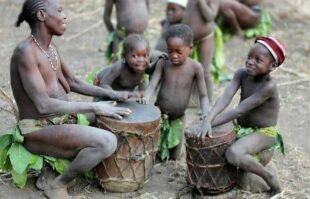Ekiti is one of the ancient states that originated from the Yoruba empire, during the lifetime of Oduduwa, known as the father of the Yoruba people. The Ekiti people are said to have a connection with the aboriginal people, who migrated from Ile-Ife (the spiritual home of the Yorubas).
Ekiti State is located in the southwestern part of Nigeria, which is bordered to the north by Kwara State, as well as to the northeast by Kogi State, to the south and southeast by Ondo State, and to the west by Osun State. History has it that Ekiti was carved from a part of Ondo State in the ‘90s, having Ado-Ekiti as its capital.
According to research, one of the greatest ethnic groupings in Yorubaland is the Ekitis, whose forefathers moved from Ile-Ife as a people. The Ekiti are a culturally homogeneous group who speak the Ekiti dialect of Yoruba. Due to its homogeneous makeup, modern Ekiti is said to have a considerable distinction among the states of the federation.
However, with an estimated population of over 3.3 million as of 2016, Ekiti is the 30th most populous and 31st largest state in terms of area. Furthermore, the Yoruba language spoken by the people in the Ekiti dialect shows slight variations. Thus, their geographic positions, particularly those near other states’ borders, have an impact on this.
In this piece, Naijabiography narrates the history and culture of the Ekiti people, including their social formation, economy, and political structure.
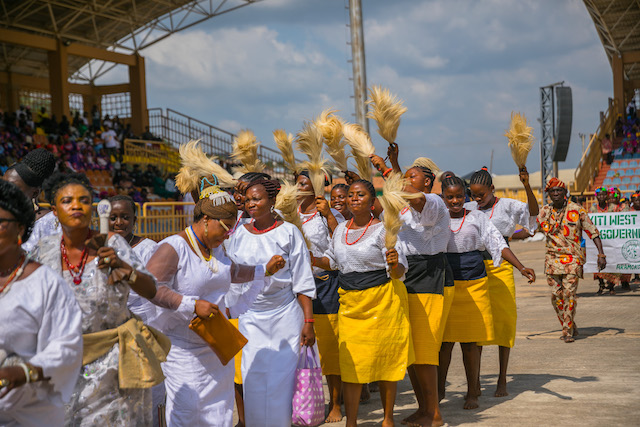
History
Aside from the known fact that the Ekiti people migrated from Ile-Ife, known as the ancestral home of the Yoruba people, and that Oduduwa (father of the Yoruba people) birthed Ekiti State, there are many sides to the story of the creation of the state.
However, before the advent of the British, Ekiti was a sovereign state. Thus, it became one of the several Yoruba states that made up what is now Nigeria. Despite the fact that there is evidence to suggest that there were indigenous people in the Ekiti region before the influx of royalty from the modern-day Ile-Ife kingdom as it grew and prospered, the Ekiti people as a nation and districts of the Yoruba race trace some of their progeny to Oduduwa, the father and progenitor of the Yoruba race.
The most recognized story of the creation of Ekiti is that which is tied to Ile-Ife. According to legend, the Olofin, one of Oduduwa’s sons, had 16 offspring. In order to find new territory to settle on, they all travelled from Ile-Ife through the Iwo-Eleru (Cave of Ashes) at Isarun and stopped at a location known as the Igbo-Aka (forest of termites) closer to Ile-Oluji.
The Owa-Obokun (the Monarch of Ijesha land) and Orangun of Ila agreed to reside in the current Ijesha and Igbomina territories in Osun state after the Olofin, the 16 children, and a few other cherished individuals reached a particularly wonderful and level field. The other 14 children continued their trek and eventually made their way to what is now Ekiti.
However, when the children realized the area had many hills, they referred to it as “Ile olokiti,” or the “country of hills,” in their home tongue. As a result, the Okiti and Ekiti subsequently merged. Ekiti’s name, thus, came from the hills.
Meanwhile, another school of thought explains that while some of the current Ekiti’s royalty may be described in this history, the state currently consists of 131 principal towns, each of which has its own royalty, as well as numerous land-owning communities that have no royalty at all.
In fact, this school of thought believes that the Eastern invaders colonized and changed the indigenous people, recognizing the Ekiti dialect when it was confused with the Ife/Oyo speech of the Yorubas. According to legend, Oduduwa, a Yoruba ancestor, visited Ife [Ife Ooyelagbo], where he encountered local residents. Thus, Agbonniregun, Obatala, Orelure, Obameri, Elesije, Obamirin, and Obalejugbe are just a handful of the old people he encountered in the town.
The Alara and Ajero, sons of Ifa, are two examples of descendants of Agbonniregun [Baba Ifa] who settled in Ekiti. The majority of Orunmila (Agbonniregunlife’s) was spent in Ado. Because of this, the proverb “Ado ni ile Ifa” (Ado is the home of Ifa) was coined. Since then, the Ekiti have lived on their current site.
In another historical narration, it was stated that the Ekiti were one of the indigenous groups that the invaders from the East (Yoruba people from Ile Ife) incorporated into Nigeria. The name Ekiti, which means “mound” in that section of the country, comes from the region’s rough, rocky terrain. It is a large, well-watered region with a number of tribes and communities living directly on the eastern border of Niger.
In particular, in political matters, they hold the Ijesas in high regard. It is thought that the progenitors of the Ekiti people travelled from Ile Ife, the Yoruba people’s spiritual home, to join the native inhabitants of the country. Oral and modern written records of Yoruba history claim that Oduduwa, the ancestor of the Yoruba, visited Ife (Ife Ooyelagbo), where he encountered settlers.
However, Agbonniregun, Obatala, Orelure, Obameri, Elesije, Obamirin, and Obalejugbe are just a handful of the old people he encountered in the town. On the other hand, the Alara and Ajero, sons of Ifa, are two examples of descendants of Agbonniregun (Baba Ifa) who settled in Ekiti. Thus, the majority of the years of Orunmila were spent in Ado.
As a result of this social formation, the Ekiti people have the saying “Ado ni ile Ifa” (that is, Ado is the home of Ifa). Therefore, the Ekiti people have ever since settled in their present location. It is also important to note that the early Ekiti settlers had 16 districts, which have been maintained to date, and each of these districts has its own king, and four are known as supreme (of which the Owa generic term is amongst them).
The 16 districts of Ekiti State include The Owore of Otun, The Ajero of Ijero, The Ewi of Ado and The Elekole of Ikole, Alara of Aramoko, Alaye of Efon Alaye, Ajanpanda of Akure, Alagotun of Ogotun, Olojudo of Ido, Attah of Aiyede, Oloja Oke of Igbo Odo, Oloye of Oye, Olomuwo of Omuwo, Onire of Ire, Arinjale of Ise, and Onitaji of Itaji. Thus, the first four districts are known as the majority, while the others are referred to as the minorities.
However, it is noteworthy to state that the Orangun of Ila is occasionally grouped with them, but since his family is different from theirs, he is just Ekiti in sympathy.
Thus, in 1996, a part of Ondo was transformed into the current state of Ekiti. It had previously been a part of Nigeria’s Western Region’s Ondo Province. While Akure, formerly considered to be an Ekiti town, was the administrative centre of Ondo province, the non-Ekiti portion of the territory was geographically dominant.
Meanwhile, the territory that is now Ekiti State was dominated by the Oyo Empire, the Benin Empire, and ultimately by the Ekiti States that came together to establish the Ekiti Confederacy in the latter half of the 1800s.
History has it that the Kiriji War, which the Confederacy and other Eastern Yoruba groups fought from 1877 to 1893 against the Ibadan Kingdom and other Western Yoruba groups, ended in a stalemate mediated by the British before the territory was colonized and added to the British Southern Nigeria Protectorate, which later merged into British Nigeria in 1914.
The present-day Ekiti state was a member of the Western Region following independence in 1960 until the region was divided in 1967, at which point it became a component of the Western State. The Eastern State was divided in 1976, and the eastern portion became Ondo State. Twenty years later, the northwest of Ondo State, known at the time as the Ekiti Zone, was divided up to become Ekiti State. However, Ekiti State was created on October 1, 1996, alongside five other new states by military dictator General Sani Abacha.
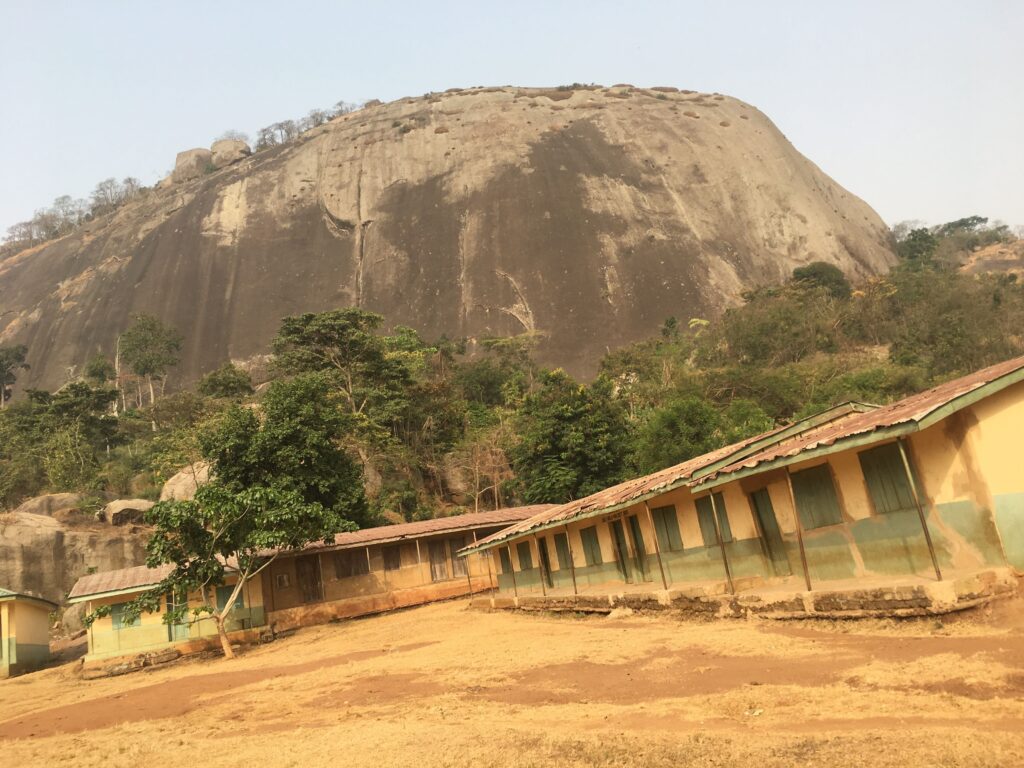
Territory
According to research, Ekiti State is divided between the drier Guinean forest-savanna mosaic in the north and the lowland forests of Nigeria in the majority of the state. In the same vein, false acraeas, mona monkeys, forest buffalo, and grey parrot populations are found in the state’s natural areas, along with a colony of roughly 20 chimpanzees that is part of one of the last remaining Nigeria-Cameroon chimpanzee populations.
Ekiti State adopted a state tree as one of its official symbols in March 2022, making it the first state in Nigeria to do so. Due to its prominence in the area and its importance to the local economy, culture, and ecology, Governor Kayode Fayemi declared that Obeche (Triplochiton scleroxylon) had been selected as the State Tree on World Forest Day 2022.
Geographically, the state rises more than 250 meters above sea level and is primarily an upland region. It is situated on top of metamorphic rock. It is often an undulating region of the nation with distinctive scenery made up of old plains interrupted by step-sided outcrops that may appear alone, in groups, or as ridges.
However, these rock outcrops are primarily found in the Ekiti provinces of Aramoko, Efon-Alaiye, Ikere, and Igbara-odo. Rugged hills dot the state, with the Ikere-Ekiti Hills in the south, the Efon-Alaiye Hills on the western border, and the Ado-Ekiti Hills in the middle being particularly remarkable.
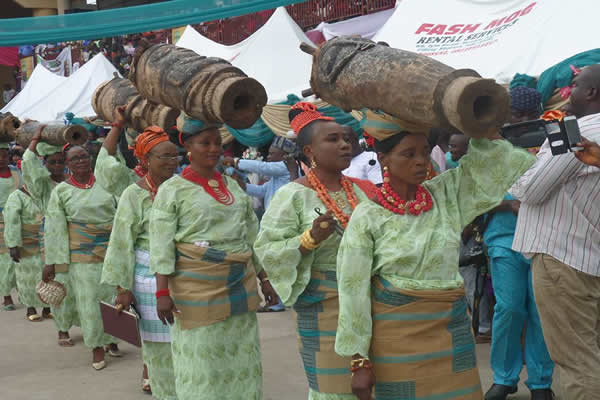
People and Culture
The Ekiti are a culturally uniform people that speak the Ekiti variety of the Yoruba language. Due to its homogeneous makeup, Ekiti has the considerable distinction among the states of the federation. The Yoruba dialects spoken by the border populations of neighbouring states in Ekiti differ slightly from each other.
For instance, Ado local government area residents do not quite speak the same dialect as Ijero local government area residents, while Ikole local government area residents do not exactly speak the same dialect as Ikere local government area residents.
Furthermore, the Otun (Moba land) community, which speaks a dialect resembling that of the Igbominas in Kwara State, is one of the communities impacted by their geographic positions. The inhabitants of Oke-Ako, Irele, and Omuo share a dialect with the Ijesas of Osun State. Wherever you are in the state, regardless of dialectal differences, you will be able to understand the other Ekiti man or woman when they talk.
Therefore, one could say that this is one of the distinctive characteristics of Ekiti. Additionally, the suffix “Ekiti” is added to the names of all towns in Ekiti State. Moreover, there is uniqueness in the languages of the Ekiti people. The languages include Ukue, Ehueun, Ukaan, Àhàn, Okpamheri, Akpes, Ayere, and Emai-Iuleha-Ora, among others. Thus, they are spoken according to the local government areas.
The state has a very diverse culture. They have distinctive traditional methods of dressing, dancing, celebrating holidays, practising their faith, and living in general. Like other Yoruba towns, they had obas as their rulers. The Yoruba people of Ekiti State are traditionally considered to have sacred or divine kings as their natural rulers.
Following their installation and coronation, they live an orderly ceremonial existence, sequestered in their palaces, subjugated to the numerous rituals of court, and only approached with the utmost respect. They hardly ever make public appearances outside of ceremonial events.
According to traditional beliefs, the obas were not only the rulers of their towns and kingdoms but also the personifications of all of their ancestors, going all the way back to the start of the dynasty. Additionally, they are the leaders of all religious orders in their kingdoms. Their appointments are made by the kingmakers, who are almost always the senior leaders, in part through divination. They are chosen from among the offspring of former tyrants.
Therefore, between their appointments and coronations, there are extravagant festivities. They are revered by their people as divinities whose well-being is intertwined with their own conditions. Thus, the holiness of their professions was neither hollow nor formal. They are the wellspring of honour and have the power to confer chieftaincy and titles. The source of justice is the obas.
Religion
Although some people still practice the traditional religion, which involves festivals and giving sacrifices to their family gods, Islam and Christianity are the two major religions in Ekiti State.
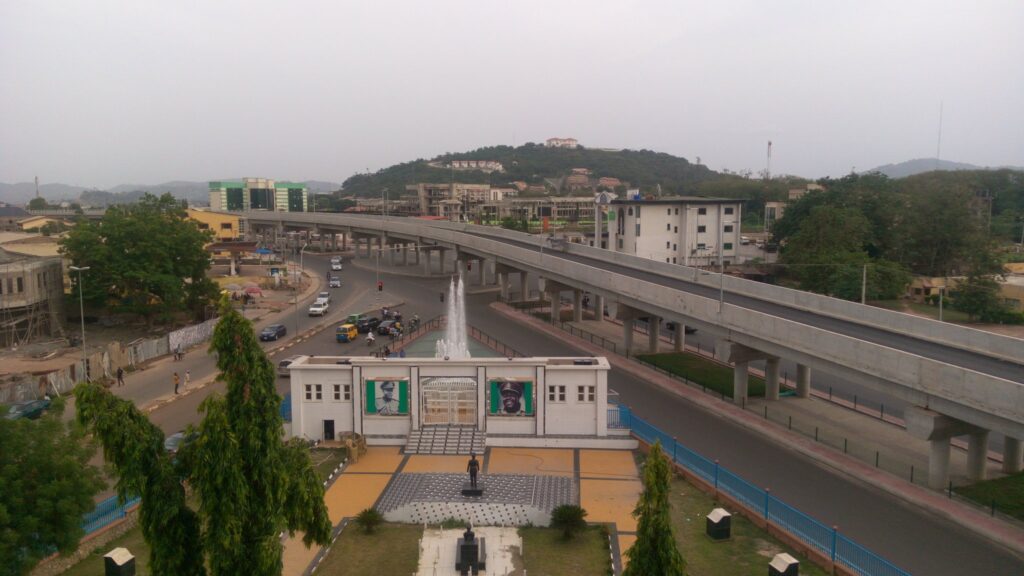
Economy
A portion of Ekiti State’s economy is focused on agriculture, with the primary crops being yams, rice, cocoa, and cassava. Also, logging and tourism are important auxiliary industries. Ekiti, which is regarded as the centre of the Ekiti people’s homeland, has the joint-thirteenth highest Human Development Index in the nation.
The land of Ekiti is naturally rich in various natural resources. The state may have abundant mineral reserves. These include, among others, gold, phosphate, kaolinite, columbite, tourmaline, iron ore, baryte, aquamarine, gemstones, and charnockite. They are primarily deposited in several cities and villages in the local government areas of Ijero, Ekiti West, Ado-Ekiti, Ikole, Ikere, Ise-Ekiti, and others.
Furthermore, Ekiti State is blessed with some land virtues; Ero, Osun, Ose, and Ogbese are a few of the land’s major rivers. Furthermore, the state is home to a wide range of tourist sites, including the Ikogosi Warm Springs, Arinta Water Falls, Olosunta and Orole Hills of Ikere, Erin-ayonugba River in Erijiyan, Ekiti, Fajuyi Memorial Park in Ado, Ekiti, and others.
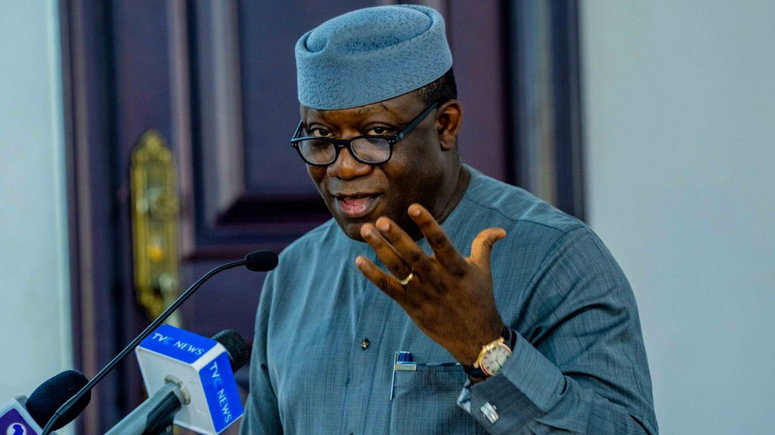
Political Structure
The current governor of Ekiti State is John Olukayode Fayemi, who was sworn into office in October 2018, having won the election on the 15th of July 2018, under the banner of the All Progressives Congress.
Furthermore, Ekiti State has 16 local government areas, which include Ado-Ekiti, Ikere, Oye, Aiyekire (Gbonyin), Efon, Ekiti East, Ekiti South-West, Ekiti West, Emure, Ido-Osi, Ijero, and Ikole, among others.
Ekiti State also invests in education. It has some tertiary institutions which include The Afe Babalola University, Ado-Ekiti which was established in 2009 and has its main campus in the capital city of Ekiti State, is one of the leading private universities in Nigeria. Other institutions include Ekiti State University, Ado-Ekiti, Federal University Oye-Ekiti, Federal Polytechnic, Ado-Ekiti, etc.
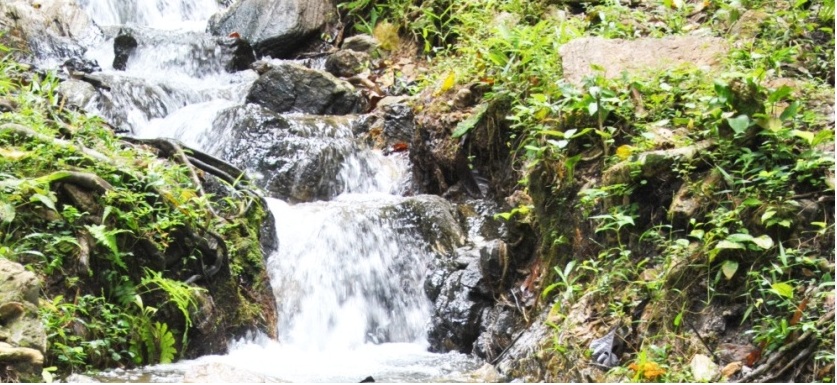
Notable People
There are some prominent people in the society whose state of origin is Ekiti State. These individuals include Odunlade Adekola (actor), Sade Adu (musician), Gbenga Aluko (senator), Niniola Apata (musician), Teniola Apata (musician), Yinka Ayefele (musician), Femi Falana (Senior Advocate of Nigeria), Falz (musician), Kayode Fayemi (Governor, Ekiti State), Ayo Fayose (Former Governor, Ekiti State), Zlatan Ibile (musician), Niyi Osundare (poet and professor), and Sola Sobowale (actress), among others.



